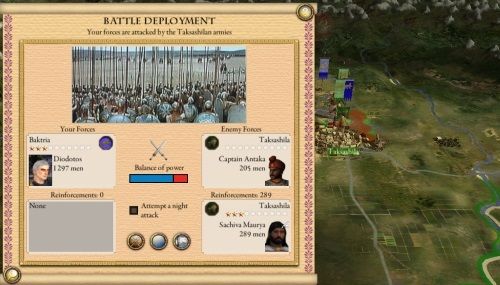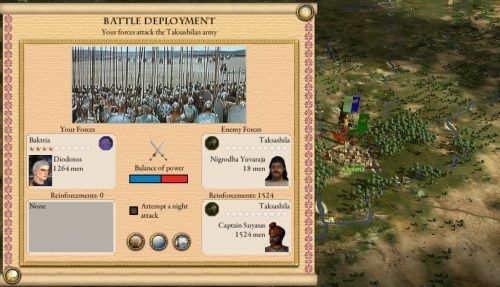The Battle of Taksashila
Location: Taksashila, Gandhara
Casualties: Diodotoi 500 , Indians 3000
Description:

This battle demonstrated the superiority of Greek infantry over their Indian counterparts. Diodotos I invented a new battle tactic for fighting in India scholars apparently called the "wave" or "rush" formation. It used the mainly hoplite-style infantry forces of the Diodotoi army to their full advantage. The soldiers would form up on the battlefield in as long of a front line as possible, sometimes stretching well over several miles. They charged at full speed and closed the distance with the enemy as quickly as possible, with the intention of pressing the line close into the face of the Indians. This forced the opponent to reckon with the Greek heavy infantry right away and made it difficult for them to employ effective archers or missile troops.
The other prominent element of the Diodotoi army was the light cavalry. Drawn from the region of Arachosia, they were used as deadly skirmishers capable of riding up on the flank of the Indian infantry and peppering them with javelins before they had a chance to respond. When the enemy tried to pursue, the Arachosian cavalry were lure the opponent out and when they had tired themselves and been scattered the cavalry would turn and massacre the exhausted pursuers.
Elephants made an appearance at Taksashila, inspiring horror in the memories of those present at the battle. Massed formations of heavy infantry were an ineffective solution. Diodotoi armies took up the practice of using loosely-spaced formations of javelin wielding troops; they would allow the elephants to pass wherever they wished and as they went they peppered the beasts and their drivers with missiles to bring them down.
The Battle of Opiana
Location: Opiana, Saurymaga
Casualties: Diodotoi 2500 , Indian Alliance 20000
Description:
In 249 Diodotos had conquered the northern plain of the Indus River. He now had a mighty army at his command, and he was positioned to complete the conquest of the whole Indus River. Fearing his power, a last coalition of the Indian polities in the Indus formed to resist the Greek invaders at the Battle of Opiana.

The Diodotoi army was battle-tested and brutally effective. The heavy infantry were like a meat-grinder, which chewed up the lightly-equipped Indian footsoldiers; elite units like the Theurophoroi punched through weak segments in the Indian line and wrecked havoc in the flanks and through the center. Arachosian cavalry cut into the numbers of the units on the flanks and often caused confusion and chaos to great effect. Heavier household cavalry charged at critical moments to destroy enemy lines and cause cascading routs. Phalangites drawn from the population of Macedonian settlers back in Baktria could form a last line of defense and reinforce weakening sections with an immovable wall of spears.
The Indian Alliance came onto the field expecting Diodotos to attack, as he customarily did. When the Diodotoi held position, the Indians made an attempt to advance on a fortified hill nearby, and take a dominant position on the battlefield.
Fatefully, the maneuver was exposed by Arachosian scouts. As soon as it was reported back in the Diodotoi camp, Diodotos raised the army to battle positions and descended on the Indian army in the thick woods. Chaos ensued. In the terrain, the Greek heavy infantry had an unquestionable advantage over the Indians. A brutal melee lasted all day but ended in a decisive victory over the army of the Indian Alliance, which retreated to Opiana and a little later was forced to surrender the city.
Diodotos became Diodotos I, master of the Indus River and the first Basileus of the Arche Diodotoi, the Diodotoi Dynasty in Northern India.
















 Reply With Quote
Reply With Quote




























































































































